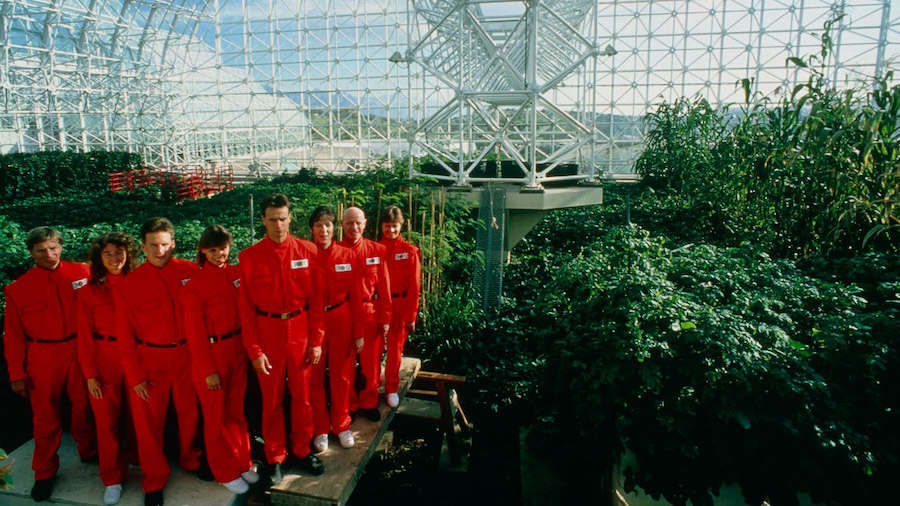LOS ANGELES: As countries begin to re-open from lockdown and quarantine, people the world over are looking forward to the chance to once again go outside. But what if the shutdowns provoked by the coronavirus disease (COVID-19) had kept people indoors and separated from each other not just for three months, but two years?
This was the reality that the crew of Biosphere 2 embarked upon in 1991. A crew of eight people entered a sealed complex, which contained miniature natural biomes: a rainforest, a desert and even an ocean complete with coral reef.

A crew of eight people entered a sealed complex, which contained miniature natural biomes. (Supplied)
In order to test sustainable environmental practices and explore the possibility of living in similar biodomes on other planets, the crew would not receive any resources from the outside world including food, water or even air. It would be up to them to farm and live sustainably until the end of their mission in 1993.
The Biosphere 2 endeavor was a phenomenon of its time, and now it has been chronicled in the new documentary “Spaceship Earth.”
“The connection between the quarantine and the Biosphere are pretty uncanny,” Matt Wolf, the documentary’s director, told Arab News.
Wolf initially stumbled upon the story of the Biosphere 2 mission online and was intrigued by the stranger-than-fiction story.

“Spaceship Earth” premiered at the Sundance Film Festival in January 2020. (Supplied)
“I came across these striking images of eight people in bright red jumpsuits standing in front of this crazy glass pyramid, and I genuinely thought it was a still from a science-fiction film,” he said.
The director got in touch with members of the group and was presented with hundreds of 16 mm film reels, video tapes and photographs. Realizing the fascinating piece of history he had found, Wolf began his documentary.
“Spaceship Earth” premiered at the Sundance Film Festival in January 2020 and was set to be distributed by Neon, of “I, Tonya” and “Parasite” fame.
Little over a month later, both the film landscape and day-to-day life were upended by the pandemic.
“It’s been amazing to see how a distributor like Neon could be agile enough to respond to the circumstances and not just say ‘too bad’ but to really make an opportunity out of it,” Wolf said.
Neon’s distribution plan is as intriguing as the film itself. With the majority of movie theaters yet to reopen, Neon has tapped into nontraditional options such as drive-in movie theaters, Hulu and VOD. The company has also gone beyond, into what Wolf calls the “next level of virtual cinema.” The distributor has reportedly partnered with over 150 museums, independent theaters, restaurants and more, all of which will be presenting the film on their websites.
“It’s a bit of an experiment,” Wolf said. “It’ll be really interesting to see the ways in which audiences connect to this film.”
For Wolf, this release plan was born from a desire to support small businesses and prompt community-based discussions about a film that is itself about a community.
“This idea that you can bring together a group of people with common goals and diverse skills and achieve extraordinary things is just what the biospherians were able to do,” he said.
Wolf was hesitant to give away too much about his film, which has been praised by critics for showing the importance and cultural impact of the Biosphere 2 experiment as well as the drama that surrounded it. The true-life twists and turns make for an engaging watch as the crew deal with the deaths of all of the animals they brought with them, political pressure from the attention the mission attracted and accusations of cult-like behavior on the part of the crew and its project lead, John P. Allen.
But throughout the infighting and string of disasters that threaten the mission, Wolf is able to keep the crew’s shared goal and teamwork at the heart of the film — an element that has resonated with the documentary’s modern-day audiences as they face their own period of isolation and strife.
“I think there’s a sense of anxiety that we all experience whether or not our day-to-day lives are radically altered,” said Wolf. “The characters you’ll meet in ‘Spaceship Earth’ share that sense of concern about what will come of our world and how we might band together to protect it in the future.”







0 التعليقات:
إرسال تعليق